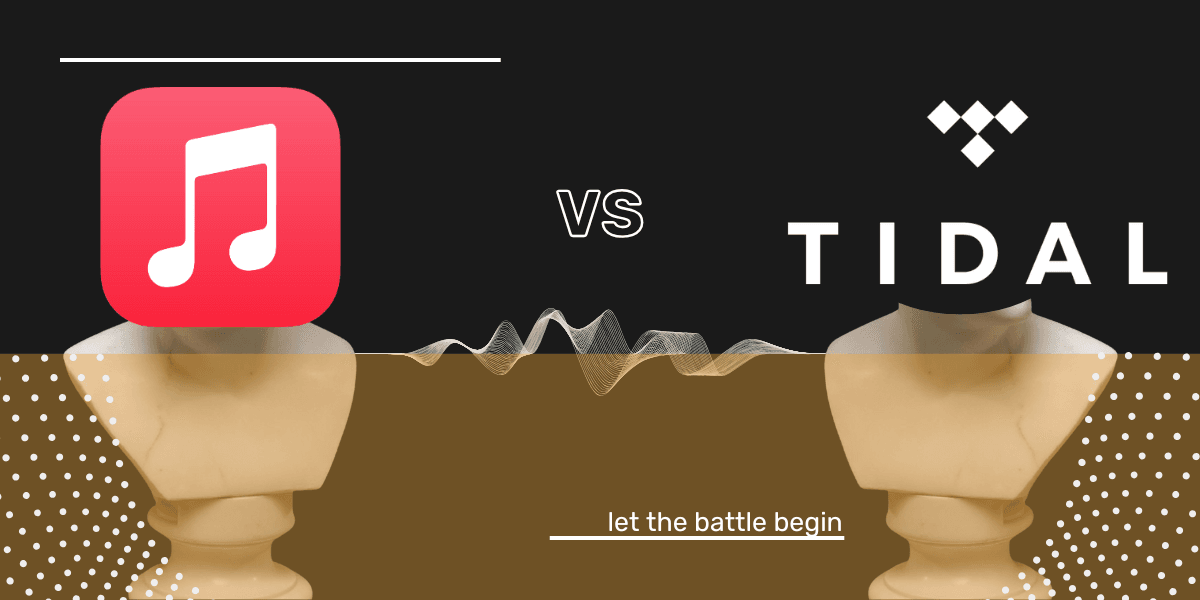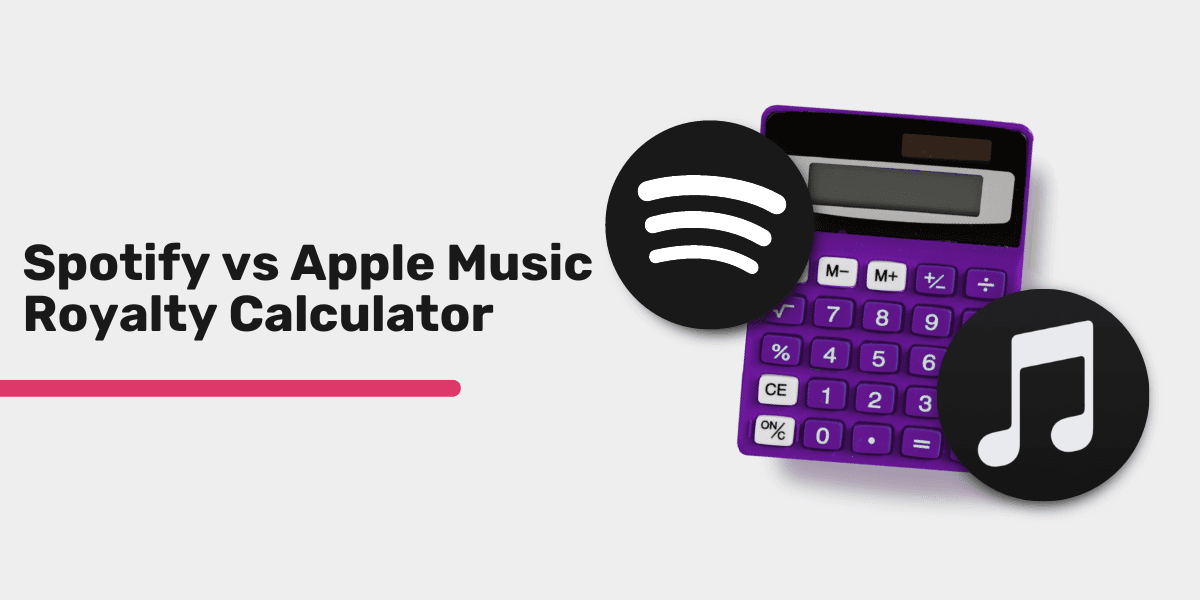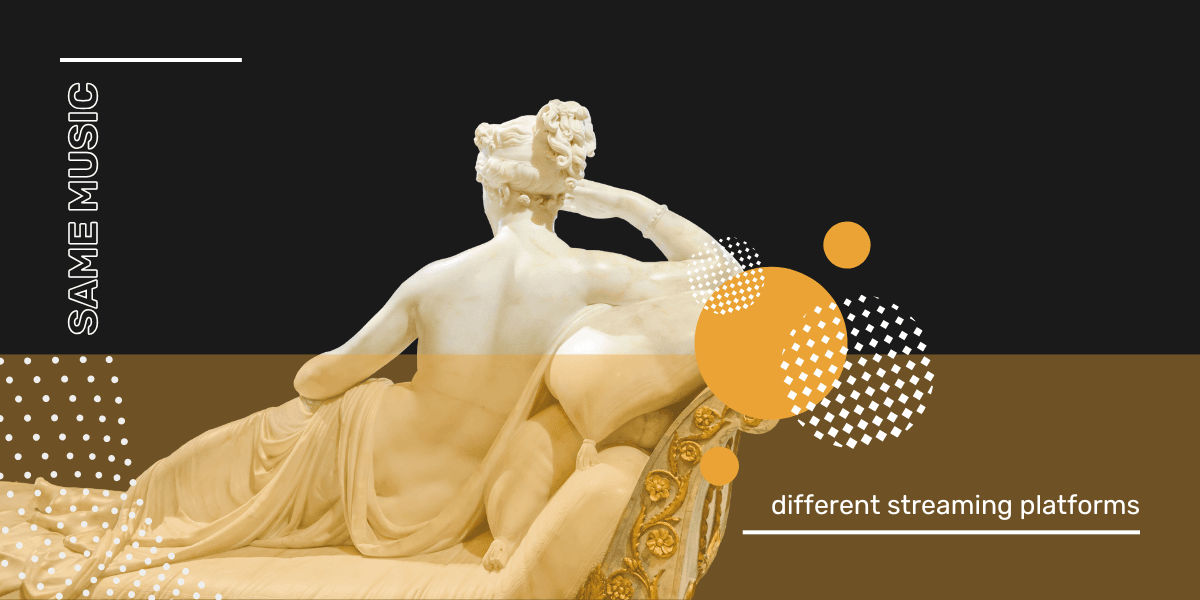Music news, tips & stories
Stay updated with the latest music streaming insights, playlist management tips, and industry news.
Apple Music vs TIDAL: 2025 Sound Quality, Discovery, and Cost.
May 15, 2025

Apple Music or TIDAL? When it comes to choosing the best music streaming service in 2024, it boils down to pricing, audio quality, and user interface (UI).
Both platforms offer huge music libraries, but cater to slightly different audiences.
Let's break down the key features of Apple Music and TIDAL to help you decide which streaming service is the best fit for you.
Value Vs Cost
When considering value, it's important to look beyond just the price tag. Things like ease of use, offline playback options, and subscription costs all contribute to the overall value.
TIDAL recently lowered its pricing putting it more in line with the industry standard around $10.99.
Both services are the same price so feature sets become the deciding factor.
Features
The features of the different streaming services will significantly impact which has the right price for you.
Here are some of the features we've taken into consideration:
- Library size: Both Apple Music and TIDAL boast massive libraries with over 100 million songs.
- Sound quality: While both offer high-fidelity options, TIDAL boasts higher quality audio in its lowest tier (160 kbps AAC vs Apple Music's 128 kbps AAC). TIDAL also supports master quality formats like FLAC and MQA (being replaced with 24-bit FLAC).
- Offline playback and downloads: Both services allow you to download music for offline listening.
- Subscription options: Apple Music offers Individual, Family, and Student plans. TIDAL has similar options, including HiFi and HiFi Plus subscriptions for higher audio quality.
- User Interface/ease of use: Apple Music is known for its clean and familiar UI, while TIDAL offers more customization options.
- Extra features: Explore curated playlists, discover new music with personalized recommendations, and enjoy features like Apple Music Replay or TIDAL Rising programs that support up-and-coming artists.
The study Music Streaming Characteristics and Consumption Emotion as Determinants of Consumer Satisfaction and Purchase Intention notes that for users in the EU and the US, offline playback, advertisements, streaming mode, and price are more important than exclusive content.
Apple Music
Apple Music doesn't offer a free tier, but they have a range of subscription options.
Apple Music Subscription Pricing
The most affordable Apple Music subscription is $5.99, and that is for eligible students; the Individual subscription is $10.99 per month, and the Apple Music Family plan is $16.99 per month.
Apple also offers the Apple One bundle, which pulls 6 Apple subscriptions into a single price.

Apple Music catalog
Apple Music boasts the largest Classical Music catalog, home to over 5 million tracks. Like many leading streaming services, Apple Music now has over 100 million songs. In January 2023, they reported 2.5 million podcasts with over 4 million episodes.
Unlike Spotify, you don't have audiobooks on the Apple Music app. Instead, they're on a separate Apple Books app - so they won't be included in the catalog here. If you want to learn more about differences between Spotify and Apple Music, check out this article.
Apple Music's unique features
We use something often, especially an app; we use it the same way every time. In the case of a music streaming app, it likely goes: open, tap playlists, and listen.
But there are many features you can test out to make the most of your subscription.
- Apple Sing - on-screen lyrics so you can sing along in real-time on Apple TV, iPad, or iPhone. Look for the microphone icon on the screen when playing music.
- An updated Replay - a weekly most-listened-to tracks playlist, and an Apple Music Replay at the end of it.
- Apple Codec - ALAC. Apple Music developed its own lossless audio compression technology. So, the entire Apple Music library is encoded using ALAC.
- Apple Digital Masters - A certification from Apple applied to the highest quality streaming; you can see the mark on tracks with the approval.
- Apple Music Classical - launched in 2023 and part of the subscription, Apple Music Classic is an app dedicated to Classical Music, with optimized search (for multiple movements, soloists, conductors, and orchestras), Spatial Audio, and ALAC.
- Apple Ecosystem - the biggest and unique thing about Apple Music is that it is in the Apple ecosystem - something none of the others can offer.
Apple Music device compatibility
You have a lot of availability when listening to Apple Music outside of your desktop or mobile device. All Apple devices, including Apple TV, HomePod, and Apple Watches, are capable.
However, you can also use Apple Music with the following devices (depending on the make and model).
- Samsung
- LG Smart TV
- Alexa (Amazon Voice Assistant)
- Google Nest
- SONOS
- Roku
- Xbox
- PlayStation
Apple Music User Interface
Apple has long been known for its crisp design, which uses a lot of negative space and white. The UI for Apple Music adheres to all of the design principles you'd expect from an Apple design.

Apple Music Partnerships
Perhaps unsurprisingly, Apple Music doesn't partner up with many other companies. For example, you're not likely to find a free six months of Apple Music when you buy a Samsung phone - but if you buy an iPhone, you will get that.
They do have partnerships, like Classical Music with the Vienna Philharmonic, which offers its recordings in a lossless format.
One of the biggest and most notable partnerships that allowed Apple Music to penetrate the market further is Apple Music and Tencent. This partnership allows Chinese artists to stream their music on Apple.
Apple Music discounts and free trials
You're not alone if you have searched for Apple Music for Free' - because who doesn't want to get the best value for money? You'll usually come up empty-handed; Apple Music keeps its offers tight.
When you buy an Apple device, you are given six months of Apple Music for free—then you switch to the premium subscription. As a standard, you will get one month free when you sign up for the premium subscription.
The student subscription is the cheapest, but you must be eligible and prove you're using their system.
For those in the Apple ecosystem, Apple Music just makes sense. It also means you get to use all of the features, making it great value, especially if you can use the six-month free trial.
TIDAL
It would be a stretch to call TIDAL one of the cheapest music streaming services on the market - but it would be fair to say that it falls under the value for money.
What sets it apart and warrants the higher cost is that it invests more in its artists than other platforms. They have a couple of subscription options - and unlike the others, they have First Responder and Military discounts.
For a TIDAL HiFi subscription, you'll pay $10.99, but most people want to move to TIDAL for the best quality, which costs $19.99 per month. The Military gets 40% off either of the subscriptions, First Responders also get 40% off, and Students get 50% off.
A Family HiFi subscription costs $16.99.. Six people can get their own account with a single payment (restrictions apply).
TIDAL's music catalog
TIDAL's music library is comparable to other streaming services and has over 100 million songs. While podcasts haven't been their focus, they have a couple - but they are more dedicated to music than talk.
There are a couple of curated podcats on TIDAL, though, and there may be more in the next year. Their podcasts are culture, creativity, and deep dives into artist discovery.

While Apple Music has its catalog in ALAC, TIDAL has 7 million tracks in Master Quality Authenticated, although currently, MQA is being replaced with 24-bit FLAC.
There are 650,000 videos on TIDAL, many of which are high-quality interviews and part of the subscription.
TIDAL's unique features
There are more than a few things that TIDAL has in its subscription to make sure that audiophiles are catered for.
Exclusive Mode lets TIDAL take the reigns on the sound coming from your desktop; it locks out the audio handling from the computer and gives you the best quality sound.
We've got a guide on how to get the most from your TIDAL subscription here: Spotify to TIDAL Plus Tips!.
Transfer your playlists to and from TIDAL; unlike other services, TIDAL recommends using a service to move music; Free Your Music makes this fast and easy.
- Sony 360 Reality Audio on TIDAL HiFi Plus: You can optimize your headphones and TIDAL to work together to offer the most immersive listening experience. We've covered that in our TIDAL GUIDE, too.
- Dolby Atmos curated playlists allow you to make the most of headphones or speakers with this capability; again, you will want the top subscription.
- TIDAL Rising—Music lovers who want to support artists should know about the TIDAL Rising program. It's not a feature you can use, but you are part of the movement by having a subscription.
- TIDAL for DJs—TIDAL for DJs is a very cool feature for novices or veterans. It is compatible with Serato, VirtualDJ, Edjing Mix, Pioneer DJ, djaypro, Denon DJ, and more. You can save playlists and remix them on one of the platform partners.
- TIDAL LIVE—For playlist curators, TIDAL LIVE is a great way to share playlists with listeners in the same territory. You'll find the LIVE button to join a session at the top of the mobile app. Interestingly, this is one feature you can access once for free, but the rest of the time, to join or share, you'll need a subscription.
- TIDAL Originals - documentaries, interviews, and events to unite artists and fans.
TIDAL compatibility
One of the benefits of having a streaming service should be that you can listen whenever and wherever you want—TIDAL Connect has many compatibilities, many of which are with some of the biggest brands in audio.
- Sony devices with 360 Reality Audio
- Cambridge Audio
- Naim
- LUMIN
- MOON by Simaudio
- Bang & Olufsen
- NAD
- miniDSP
- Lyngdorf
- Chromecast
- Loutd
- Yamaha
- Amazon Alexa
- SONOS
- Smartwatches
Some have Sony 360 Reality Audio capabilities, others have Dolby Atmos, and some have HiRes FLAC capabilities. For MQA, BluOS, Roon, Cambridge Audio, Astell&Kern, and MOON by Simaudio are the best options.
The car options are Tesla, Volkswagen, Mercedes-Benz, CarPlay, and Android Auto.
TIDAL partnerships
Streaming services' partnerships can give you more reason to opt for them; here are some TIDAL partnerships worth knowing about.
- TIDAL and Universal Music Group are partnering to explore options for creating an economic model that should better reward artists based on how subscribers interact with them.
- TIDAL & Vivo - Vivo is a Brazilian telecoms group, and TIDAL is repacing their WatchMusic option. Two months free for first-time subscribers, and then standard subscription costs (option to have a weekly or monthly subscription payment)
- TIDAL & Tesla - A HiFi or HiFi Plus subscription can be integrated into the Tesla control panel.
- TIDAL & Jlab—When you purchase JLab headphones, you receive three months free of TIDAL HiFi. JLab offers 'luxurious sound on a budget.'
- TIDAL & Maserati - Grecale and MC20 owners get a free three-month TIDAL HiFi subscription.
TIDAL's UI
TIDAL's UI is sleek and easy to use. It's less cluttered than Spotify's and perhaps not as clean as Apple Music's, but the mobile app has some cool features, and the desktop app gives you a lot of control over how you listen to your music.

TIDAL special offers and cost
You can get six months of TIDAL from a couple of offers they run, but they're not always up, so it can be worth waiting until it comes back up. Here are a couple of ways to get that half-year free subscription:
- TIDAL's trial is one month, although they regularly offer three months.
- Buying Jlab headphones, you'll get a three-month subscription.
- Buying a Maserati or Mercedes-Benz will get you a three-month trial.
- For DJs, getting a Denon DJ Prime Series piece of hardware offers a three-month trial.
- Swisscom has a TIDAL HiFi three-month trial when you sign up.
- Sony offers a three-month trial with the Xperia - which has Sony 360 Audio decoding.
- Boost Mobile offers a massive six-month free trial; go to Manage My Pand and Add Ons to activate the $0 Tidal 6-Month Trial.
- The TIDAL HiFi subscription costs $10.99 monthly, and Family HiFi is $16.99. The student subscription is at least 50% off, and Military and First Responders both get 40% off (a discount not seen elsewhere).
The difference between TIDAL and Apple Music sound quality
Anyone who is listening on a cheaper pair of headphones, or on a bluetooth connection isn’t going to notice a big difference between Qobuz, TIDAL, Deezer and Apple Music.
However, those who listen to music on Spotify and then take a listen to the same song on TIDAL or Apple Music will notice a huge difference. Even without the best set of headphones.
| Audio Quality Setting | Tidal | Apple Music |
|---|---|---|
| Normal / High-Efficiency | 160 kbps (AAC) | 128 kbps (AAC)(low bandwidth mode) |
| High / High-Quality | 320 kbps (AAC) | 256 kbps (AAC) |
| HiFi / Lossless | 1,411 kbps (FLAC) | 1,411 kbps (ALAC) |
| Master / Hi-Res Lossless | 2,304 - 9,216 kbps (FLAC, WAV) | 2,304 - 9,216 kbps (ALAC) |
The numbers are almost identical, but there are two difference that could be the decision makers when it comes to the best audio quality. TIDAL’s lowest quality is higher than Apple Music’s lowest quality. For most people, you’re not going to notice this.
Getting deeper into the details, Apple Music’s default audio is reported to be warmer than TIDAL, and because of that the ALAC sound signature is more popular for casual listeners.
Switching to Spatial Audio will cut some of that depth, but you’ll hear more of the mids and highs because of that. And often, during testing Apple Music is louder in general too.
TIDAL has a different approach, and a slightly different musical feel. It’s tighter in the lows, and for some that will sound cleaner too. Picking out different instruments is often easier too - because there is some level of separation in them.
But where TIDAL really stand out, is that it supports both Spatial Audio and Sony 360. Giving the listener complete control over the entier sound profile.
When it comes to audio, this is a personal thing, and you’ll need to make use of both trials and test the sound settings for yourself. For music lovers who want the best experience, TIDAL gives a lot more control when combined with Sony 360.
TIDAL vs Apple Music music discovery
New Music Friday is always great for finding new music to listen to. But your streaming service shouldn’t be regurgitating the same music over and over (looking at Spotify there).
While Apple Music does have the NewMusic Mix and Stations, it doesn’t have the range of options that TIDAL does.
TIDAL offer My Mix and you’ll get 6 or more personal mixes of music you enjoy and similar artists you might not have heard before. Following with a Daily Discovery, a set of around 10 tracks that you most likely haven’t ever heard.
TIDAL also have the added bonus of things like Rising and Collabs. New artists are pushed the to front, so that you’re more likely to take notice.
Nurturing new artists talent is one of the was that TIDAL are doing the most when it comes to new music discovery.
My New Arrivals is an interesting mix, because it’s not just based on the artists. Instead it includes producers, writers and more that you have been listening to and might not notice.
The speed of personalized playlist generation is faster on TIDAL too. Spend a few hours listening to your favorites, and your Mixes will appear quickly.
And, doubling down a little more on the playlist creation, you can find playlists from your favorite writers with a range of genres and artists in - and th same for producers.
Apple Music or TIDAL?
Apple Music is a good choice for:
- Casual listeners who are happy with the sound quality from their phone or computer speakers
- People already invested in the Apple ecosystem
- Those who prioritize a clean and familiar user interface
TIDAL is a good choice for:
- Audiophiles with high-quality headphones or sound systems who want the absolute best sound quality
- Listeners who want more control over the sound profile with features like Spatial Audio and Sony 360 support
- People who are interested in discovering new music through TIDAL's personalized playlists and focus on up-and-coming artists
To sum up, here's a quick breakdown of the key differences:
- Sound Quality: TIDAL offers higher quality audio in its lowest tier and a wider range of high-fidelity options.
- Music Discovery: TIDAL has more personalized playlists and features to help you find new music.
- Cost: Apple Music and TIDAL have similar pricing for their basic subscriptions, but TIDAL offers student and military discounts.
- Device Compatibility: Apple Music works seamlessly with Apple devices, while TIDAL has a wider range of compatible devices with some high-end audio integrations.
- User Interface: Apple Music has a clean and familiar UI, while TIDAL's is a little more cluttered but offers more customization options.
- Free Trial: Apple Music offers a one-month free trial, while TIDAL's trial is typically one month but can sometimes be three months with partner promotions.





